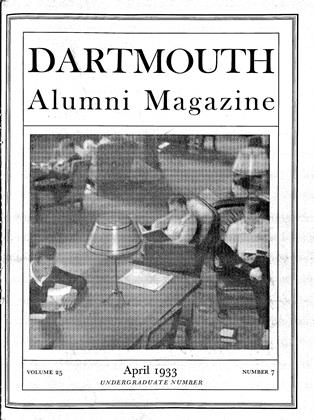TRUE PROGRESS in education is rarely the result of mass evolution; more often it is due to the farsighted wisdom of a few isolated leaders who have the opportunity and the backing to put their ideas into practice. Following the liberal step which President Hopkins took several years ago in establishing the Senior Fellowships at Dartmouth, comes the news from Harvard that President Lowell has at last announced his long-projected "paradise for scholars." This move is a most commendable and courageous one, in view of the chronic hostility of educators toward any attempt to minimize the importance of the Ph.D. degree. The Society of Fellows is designed to do for twenty-four post-graduate students at Harvard what the half-dozen Senior Fellowships do for undergraduates at Dartmouth; in the words of President Lowell, to separate "future creative scholars into a distinct body that will have a greater attraction for ambitious men of talent. . . . Such an atmosphere should carry intellectual contagion beyond anything now in this country."
The Society of Fellows, to be chosen this year, may be compared to All Souls' College at Trinity (in Cambridge, England) which encourages purely original scholarship, and which has to date contributed more than one-half of the British winners of the Nobel Prize. Like the Rhodes Scholarships, appointment to the Society will be for a period of three years, and will carry a generous stipend; but unlike Rhodes men, the Harvard scholars will be given absolute freedom and will work for no degree. Such an inducement ought to draw the finest creative and critical minds among the young men graduating each year from American colleges; it will keep them on American soil, and should offer no competition for the Rhodes group, which is chosen on the basis of conservative scholarship, athletic prowess, and the solid virtues.
To be ideally effective, the Society of Fellows ought to include the artistically creative as well as the scholarly creative type, and strike a balance between the two. Not in individuals, for only the rare man can be a scholar and an artist at the same time, but as to numbers. Inevitably those institutions would have benefited, if T. S. Eliot had remained at Harvard, instead of going to London to found and edit a distinguished quarterly; if Edmund Wilson had returned to, if Eugene O'Neill had stayed to graduate from, Princeton; if Sinclair Lewis had endured Yale a while longer, devoting his uncanny eye for detail, his energy, and industry, to scholarship instead of literature! What a sociologist he would have made! If Harvard can keep close to her even a few of the Robert Frosts, the Conrad Aikens, the Walter Lippmans of the future, then the Society of Fellows will more than justify itself.
A Boston newspaper, commenting on the announcement of this new scheme, remarked that: "The establishment of the society has dealt the first body-blow to the time-honored requirement of the degree of Doctor of Philosophy for university professorships." How serious a blow the practical working of the Society of Fellows alone may determine. Critics have pointed out that pressure may be brought to bear on members of the society to engage in research which will closely parallel that required in preparation for a Ph.D. degree. If this should be the case, that ideal which President Lowell had in mind would have been ignored, and the benefit of the society nullified. Secondly, critics hold that members of the Society of Fellows, for the first few years, until the fame and prestige of the body had become well established, would be martyrs on the altar of Educational Experiment. Inasmuch as work for the degree of Doctor of Philosophy is supposed, throughout the land, to be the only sure way to fit a man for college or university teaching, the exFellow from Harvard would, in the face of stiff competition, be unable to get an appointment.
A parallel problem arises in connection with the Senior Fellows at Dartmouth who are appointed each year by President Hopkins, exempted from class attendance and from tuition, and allowed the use of college facilities for individual research. If a man intends to take post-graduate work, with a view to teaching, the Senior Fellowship is a handicap to him, say critics of the scheme; therefore let him enroll in those courses which he would have taken had he not been elected a Senior Fellow, and attend them regularly. Should he do this, the ideal behind the Senior Fellowship would be betrayed.
That very courage which it takes to ignore, first, as an undergraduate, the Phi Beta Kappa key; second, as a graduate, the degree of Doctor o£ Philosophy, is the one quality necessary if both these Utopian orders are to succeed.
 View Full Issue
View Full Issue
More From This Issue
-
 Article
ArticleDARTMOUTH MEN IN AVIATION
April 1933 By Carroll A. Boynton '33 -
 Class Notes
Class NotesClass of 1910
April 1933 By Harold P. Hinman -
 Article
ArticleHANOVER BROWSING
April 1933 By Rees Higgs Bowen -
 Article
ArticleNorthern April PART ONE
April 1933 -
 Class Notes
Class NotesClass of 1902
April 1933 By Hermon W. Farwell -
 Article
ArticleTHE UNDERGRADUATE CHAIR
April 1933 By J. S. Monacan'33.
Kimball Flaccus '33
-
 Article
ArticleMUSIC REMAINS
May 1934 By Kimball Flaccus '33 -
 Article
ArticleWhiteface, New Hampshire
December 1942 By KIMBALL FLACCUS '33 -
 Article
ArticleThree Aleutian Love Poems
November 1946 By KIMBALL FLACCUS '33 -
 Feature
FeatureGOTHAM GAMBIT:
December 1956 By KIMBALL FLACCUS '33 -
 Feature
FeatureTHREE POEMS
January 1958 By Kimball Flaccus '33 -
 Article
ArticleTwo Poems of England, Long Ago
NOVEMBER 1970 By KIMBALL FLACCUS '33








